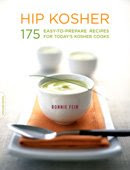Hip Kosher Cooking
The rules of keeping kosher mandate that milk and meat can never be served together. Therefore, any kosher meal that contains meat will be dairy-free. There's also a third class of foods known as parve (or pareve) that are neutral foods that contain neither milk nor meat. Plant foods are parve is no dairy is added. (Fish is also parve, which can be confusing and a problem for vegans, but not for those just looking to avoid dairy.
The milk substitute industry in the U.S. was born with firms seeking to making acceptable substitutes for kosher audiences. Today, more and more kosher chefs are relying on these products to extend the tradition range of kosher cooking to more modern-sounding dishes, foods that might actually be called "hip."
At least that's how Ronnie Fein titled her new cookbook, Hip Kosher.
"I don't know if I'm hip, but my food is," says Fein, whose book includes outside-the-box options such as a kosher Cubano sandwich, in which corned beef, turkey and soy cheese replace the more traditional ham and roasted pork.
An article from the Canadian Press explained the origin and breadth of this trend.
This new, more cosmopolitan look to kosher is due in part to the growing affluence and influence of American Jews, says Deborah Dash Moore, a historian and director of the University of Michigan's Frankel Center for Judaic Studies.
It also doesn't hurt that Americans as a whole are expecting more from their dinner plates.
"With TV shows like 'Top Chef' and the programs on the Food Network, people are becoming more aware of food," says Tamara Holt, food editor for the recently launched (and also very hip) Jewish Living magazine.
"That's no different for people who keep kosher," she says. "It just presents additional challenges."
And those challenges have become less daunting. A vast - and ever expanding - array of kosher foods, including non-dairy milks and vegetarian sausages, makes substitutions easy.

No comments:
Post a Comment